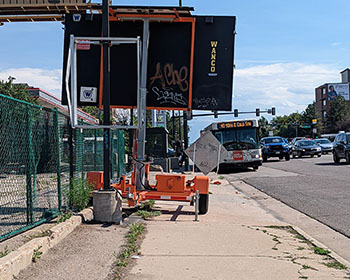MPC Region Info
University of Denver
 The United States has developed one of the best transportation systems in the world. However, because each mode of transportation evolved independently of the others, they are not well integrated. As a result, both passengers and freight face challenges when moving through the system and when moving from one mode to another. Furthermore, some modes are over utilized, creating delays and hazards, while other modes are underutilized and have excess capacity. At the University of Denver, two coordinated groups have emerged to address and enhance the national transportation systems: the National Center for Intermodal Transportation and the Denver Transportation Institute. NCIT's research, outreach, and education efforts contribute to the national transportation system by enhancing the multimodal system based on a more balanced and rational use of all modes of transportation. The Denver Transportation Institute engages in world-class executive education to provide transportation organizations with the human resources needed to effectively enhance and manage those systems.
The United States has developed one of the best transportation systems in the world. However, because each mode of transportation evolved independently of the others, they are not well integrated. As a result, both passengers and freight face challenges when moving through the system and when moving from one mode to another. Furthermore, some modes are over utilized, creating delays and hazards, while other modes are underutilized and have excess capacity. At the University of Denver, two coordinated groups have emerged to address and enhance the national transportation systems: the National Center for Intermodal Transportation and the Denver Transportation Institute. NCIT's research, outreach, and education efforts contribute to the national transportation system by enhancing the multimodal system based on a more balanced and rational use of all modes of transportation. The Denver Transportation Institute engages in world-class executive education to provide transportation organizations with the human resources needed to effectively enhance and manage those systems.
In general, research, education, outreach and policy efforts at the University of Denver contribute to reduced congestion, increased competition and efficiency, improved capacity, and addresses conservation and sustainability.

News Article
Learning from the Travel Experiences of Persons with Disabilities (May 2024)
Full Article
University Labs / Resources
- National Center for Intermodal Transportation (NCIT) focuses on improving the national transportation system through the combined focus on workforce development and improving safety. By enhancing the human resources in the system through executive education and conducting research designed to identify and address barriers to the recruitment and retention of women and underserved members of society we hope to needed to improve the transportation systems' connectivity and capacity as well as reduce congestion. NCIT also seeks to improve the capacity and capability of the workforce to meet the challenges of the increasingly complex passenger and freight transportation system. Safety research and policy generation on human factors and other operationally related practices such as work schedules, fatigue and hours of service is also a primary concern of the NCIT.
- Denver Transportation Institute (DTI) focuses on developing the next generation of senior leaders in the transportation, logistics, and supply chain industries. The executive Master of Science in Transportation Management builds a unique leadership skillset. The program provides all the advantages a graduate management degree with the added value of learning transportation and supply chain concepts, best practices, and proven tools to create higher levels of productivity and profit.
- Unmanned Systems Research Institute serves as the focal point for basic, applied research and development activities in unmanned systems in general and unmanned aircraft systems in particular in the State of Colorado. The Institute promotes knowledge, education, research and development in unmanned systems. It contributes to the advancement of higher education by benefiting students, researchers, scientists, engineers and practitioners through the advancement of the state-of the-art in unmanned systems.
Department Information
National Center for Intermodal Transportation
University of Denver
2400 S. Gaylord, Suite 232
Denver, CO 80208
Phone: (303)871-2495
Email: patrick.sherry@du.edu

